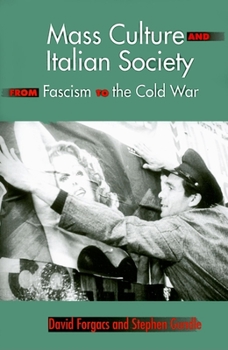Mass Culture and Italian Society from Fascism to the Cold War
The 1930s to the 1950s in Italy witnessed large increases in film-going, radio-listening, and the sale of music and weekly magazines. The industries that made and sold commercial, cultural products were transformed by the new technologies of reproduction and new approaches to marketing and distribution.
Yet historians tend to place the "real" genesis of mass culture in the 1960s, or to generalize about the harnessing of mass culture to the Fascist political project, without considering what kind of mass culture existed at the time and whether this harnessing was successful. This book draws on extensive new evidence, including oral histories and archival material, to explore possible continuities between the uses of mass culture before and after World War II.





